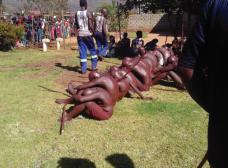Getting through the initiation season
MOKOPANE – Every year, the Limpopo department of health is tasked with ensuring that the annual initiation school programme does not claim any lives. The programme for for Limpopo started in 17 June and concluded last Monday, 18 July, writes Peter Maluleka and Morakhu Kekae.
Reports from the department of health in Limpopo indicate that about 12% of attendees died during ritual circumcisions in 2015 (the department also closed down more than 60 initiation schools that did not have the correct paperwork). This year some 44 schools where approved in the Waterberg district. This year 27 people died through botched circumcisions and dehydration, a decrease from 2015 when 44 people died.
Scotch Mapokga, a traditional healer from Mosesetjane village, told Northern News that some 100 male initiates participated in the ritual in the mountains outside Mokopane this year. He explains that the circumcision ceremony is a test of courage, manhood and much more than just a procedure.
Koma, the Pedi word describing the circumcision ritual, is fundamental to the traditional customs of the Pedi people. Mapokga explains that it is not a rigid, inflexible, ritual. “Every winter, about 100 men take part in this ceremony to learn about the legacy and traditions of their forefathers,” he says. “The core value of the seclusion is to transform boys to be men and teach them about manhood, discipline and respect as men are the heads of the house in the Pedi culture.”
The young initiates conquered cold chilly winter nights for three weeks with fire being the only source of heat. During the ritual, which can cost about R800 per initiate, the communities get involved - there are goats to slaughter, traditional blankets to be made, a week’s worth of food to gather, traditional surgeon fees and drinks to celebrate when the youth return.
“Parents play a critical role in helping their children to cope with the initiation process,” says Rosina Masepa, a mother of one of the initiates. While the teenagers are spending time at the mountain, she says, you have sleepless nights, wondering if your children will return home safely.
In the villages the majority of residents believe that the initiation rituals are an important part of the teenagers’ lives as the elders believe that they can only be a fully functional members of a rural society once they have gone through the initiation process. However, in recent years many parents have voiced concerns about the negative impact that the rituals can have. Some parents deem the practice irrelevant and dangerous and opt for medical circumcision instead.
Unlike their male counterparts, girls don’t go through the cold winter nights without blankets; they are initiated at an assigned traditional healer’s house that provides them with food, shelter and warm clothing. The women are confined to the hut for the period of seclusion and are taught about family values, motherhood and receive sex education.
The men are watched over by elders who facilitate the process and ensure that they are protected. When the initiates return they are showered with gifts, money, praise songs and graduation ceremonies are usually held at home. This is done to celebrate and applaud their bravery and their return sees respect earned from their peers.
Mapokga says he is an experienced Matlala, a name defining a traditional ‘surgeon’, highlighted that traditional leaders are often to blame for maladministration, conspiracy and corruption for the controversy surrounding the notion of claimed deaths during the process. “Our community leaders sometimes permits inexperienced traditional surgeons to head up the seclusion process.”
“Our community leaders practices have turned into a commercial enterprise,” stresses Mapokga . “Our leaders care about the business side of the process rather than ensuring that the safe practice principles are adhered to.”
The department of health reports that in order to comply with regulations governing traditional circumcision, initiates must be at least 18 years or older, must present a written parental or guardian consent to the department. The initiates, the traditional surgeon and the overseer must all be registered with the department and have the necessary permits. Failure to comply may result in fines or even arrests.
John Masimini , principal of Gwenane High School in Extension 19 in Mokopane, is less enthusiastic about the return of the initiates and feels that these young men often turn arrogant when they return. “Often these teenagers turn into hooligans once they return from the mountain,” he says. “I have been there myself and believe that the treatment they receive during the circumcision process influence them to act out in a negative way.”













0 Comments